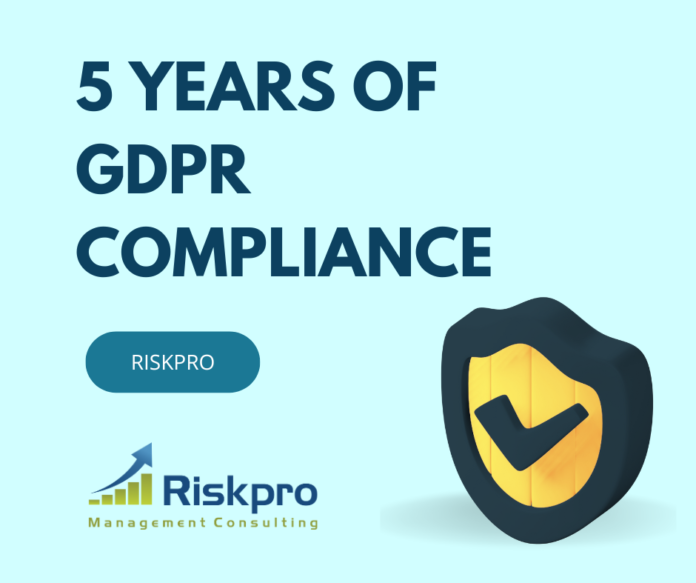What is GDPR and When Did it Start?
5 years ago, in 2018, something important happened in the world of data protection. It’s called GDPR, which stands for General Data Protection Regulation. This is a set of rules made by the European Union (EU) to keep your personal information safe and give you more control over it. Let’s take a closer look at what these five years have meant for your data and privacy.
What’s Good About GDPR?
GDPR did some really good things for your data and privacy. It makes sure that companies treat your information with respect and let you know how they’re using it. This way, you can trust them more. It also gave you more rights, like being able to correct wrong information or even ask them to delete your data.
What’s Different After 5 Years?
Before GDPR, companies didn’t always tell you what they were doing with your data. Now, they have to explain it clearly, so you know what’s going on. This helps you understand and feel better about how your information is being used. Today, there are awareness programs spreading the importance of GDPR.
What Got Better?
Companies had to be more careful with your data. They improved their security to prevent bad people from stealing it. Also, if there’s ever a problem and your data gets exposed, they have to tell you about it. This makes sure you know what’s happening with your information.
What’s Hard About Following GDPR?
For businesses, following all the rules of GDPR can be tough. Sometimes, it’s hard for them to balance between following these rules and coming up with new ideas. It’s like trying to do two things at once.
Why Do Data Breaches Still Happen?
Even with GDPR, sometimes bad people can still get hold of your data. This is called a data breach. It’s something that everyone has to be careful about, even with the new rules in place. Riskpro has partnered with Regtechtimes to create a full length certification on Data Privacy
Why Is Sending Data Across Countries Tricky?
If your data needs to go to another country, things can get complicated. Each country might have its own rules, and companies need to make sure they’re following them all. This can make things a bit tricky.
How GDPR Changed Businesses
Companies had to do a lot to follow the new rules. They needed to have someone in charge of making sure they’re doing things right. This person is called a Data Protection Officer. They also had to change the way they work with data and tell you about it in clear language.
Did New Things Come Up?
Because of GDPR, companies started using new tricks to keep your data safe. They used special technology and made sure only the right people could see your information. This way, they could still use your data for good things without risking your privacy.
Was There a Cost to Following GDPR?
Yes, there was a cost, but there were good things too. Companies need to spend money to follow the rules and make sure your data is safe. But because they did this, your information became more secure, and you could trust them more.
What Will Happen Outside the EU?
The ideas from GDPR are spreading outside the EU. More countries are making similar rules to protect your data. So even if you’re not in Europe, these rules might still help keep your information safe. In 2023, India presented its Data Protection Bill.
What About New Technologies?
As new things like robots and smart devices come up, your data might be used in different ways. This is a challenge, and the people who make the rules will need to think about how to protect your privacy while still letting you enjoy these cool technologies.
How Will Data Protection Change in the Future?
In the next years, things will keep changing. More places might make new rules to protect your data. It’s important for companies to keep learning and adapting to these changes, so your information stays safe.
Looking Back and Ahead
So, 5 years have passed since GDPR started. It made sure your data is treated better, gave you more control, and pushed companies to do better with your information. As time goes on, it’s up to everyone to keep working together to make sure your privacy is respected and your data is protected.
Frequently Asked Questions
-
What is GDPR, and when did it start?
- GDPR stands for General Data Protection Regulation. It began in May 2018 to protect your personal data and privacy.
-
How did GDPR change things for me?
- GDPR made sure companies are clear about how they use your data and gave you more rights over your information.
-
Why do data breaches still happen if there’s GDPR?
- Even with GDPR, bad people can sometimes get your data. It’s a challenge to keep data safe.
-
Did companies have to change anything because of GDPR?
- Yes, they had to follow new rules, be more careful with your data, and explain things better.
-
What’s coming next for data protection?
- More countries might have rules like GDPR, and new technologies will need new ways to protect your data.
-
Why is data protection important?
- Data protection is about making sure your personal information is safe and that you have control over how it’s used.

